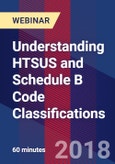Why Should You Attend:
Importers need to know their product’s Harmonized Tariff Schedule of the United States (HTSUS) numbers. By becoming familiar with the Harmonized System, exporters will become familiar with how The Schedule B (also known as the Statistical Classification of Domestic and Foreign Commodities Exported from the United States) works. This knowledge is necessary:- You should attend if you need help in classifying products.
- You should also attend if you no longer want to be mystified or intimidated by the HTSUS.
- To determine applicable import tariff rates and whether a product qualifies for a preferential (that is, reduced or free) tariff under a free trade agreement;
- (For exporters) To file the Electronic Export Information (EEI) in ACE
- To complete shipping documents, such as certificates of origin
- To keep importers happy
- To stay out of trouble with U.S. Customs and Border Protection (CBP0 and other U.S. federal entities, and avoid costly and aggravating penalties.
Areas Covered in the Webinar:
- Introduction to and the differences between the HTSUS and Schedule B Code
- The Six General Rules of Interpretation (GRIs)
- Additional U.S. rule of interpretation
- Applying the section and chapter notes of the HTSUS
- Using the World Customs Organization's (WCO's) explanatory notes
- Binding rulings issued by US customs and border protection and informed compliance publications
- Handling special classification issues (Parts, Kits, Sets)
- The importance of commerce invoice descriptions
- Review the roles of a customs broker, freight forwarder and importer/exporter of record
- Determine the difference between duty, user fees, and antidumping/countervailing duties
- Best Practices for effective product classification processes
Who Will Benefit:
- Customs and Export Compliance Managers and Personnel
- Freight Forwarders
- Customer Brokers
- Importers
- International trade consultants
- Classification specialists
- Import managers
- US and Global Trade Compliance Professionals
- Purchasing and Procurement Departments
- Supply Chain Professionals
- Attorneys and Legal Staff
- International Logistics Professional
- Sales & Marketing Professionals
- Exporters
- logistics companies, including 3PL and 4PLs
- Ocean, air and other freight forwarders
Speaker
Martin BehrCourse Provider

Martin Behr,









